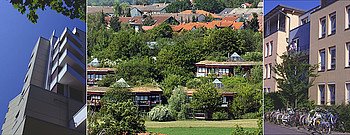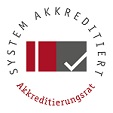Molecular Nutrition (Master’s)
Fit for molecular nutrition research
Molecular Nutrition (Master’s)
Fit for molecular nutrition research
In the research-oriented Master's program in Molecular Nutrition at the University of Hohenheim, you will focus on the molecular aspects of nutrition. In particular, this program focuses on the mechanisms of food effects and the effects of dietary patterns in healthy individuals and at-risk groups. This means research is ongoing into the interactions between nutrition, intestinal bacteria, and the immune system, the effect of bioactive food ingredients, and the neurosensory regulation of hunger and satiety, among other things. The degree program provides you with a solid foundation for future professional work in research, professional associations, and the industrial sector.
- Nutrition-dependent illnesses
- Studies with a focus on research
- Subject-specific knowledge of methods
- Reasons to Choose Hohenheim
| Degree Master of Science (M.Sc.) |
4 semesters 120 credits |
Language German |
University places 24 |
Location Stuttgart |
|||||
In the first year of study, you will deepen your knowledge of nutritional-physiological processes in the body by understanding the underlying biochemical, physiological, immunological, and pathophysiological processes. In addition, you will learn methods of nutrigenomics.
In the second year of study, you will set individual focal points and acquire subject-specific methodological skills. Of central importance for this is the "Experimental Nutritional Science Project," with which you are specifically guided towards the final thesis. The academic year is designed so that you can acquire the competences at foreign partner universities or at non-university research institutions. The Office of International Affairs can provide you with detailed information on this. The experimental Master’s thesis, for which you have 6 months, completes the program.
By completing the experimental Master’s thesis in the fourth semester, you demonstrate the ability to conduct scientific work independently. The Master’s degree in “Molecular Nutrition” qualifies you for activities in basic research and the implementation and communication of nutritional findings in social practice.
Prof. Dr. Jan Frank (Department of Biofunctionality and Safety of Food)

"Research and teaching – Hohenheim offers you the best environment to do both!"
- Research & development in biological science, food science, and the pharmaceutical sector
- Basic research in nutritional science, biology, and medicine
- PR in the industrial and public sectors as well as for associations
- Superb supervision in small cohorts
- Research-oriented study programs
- Connection of research and practice
- Excellent laboratories and internship facilities with cutting-edge equipment

The Master’s degree program in Molecular Nutrition is offered jointly by the Institutes of Nutritional Science and Nutritional Medicine. The goal of the program is for you to understand the effects of nutritional patterns and food ingredients at the cellular and molecular levels. In addition, you will be able to identify and develop innovative therapeutic approaches using the latest methods and techniques.
Research focus
Nutrition science research at the University of Hohenheim focuses on the complex of topics “Prevention, detection, and therapy of nutrition-related or nutrition-dependent diseases.” With a view to preventing nutrition-related diseases and establishing therapeutic approaches, we develop knowledge in the following areas:
- Physiological implications and safety of bioactive dietary ingredients or dietary supplements
- Nutrition/intestinal flora/immune system interactions
- Neurosensory regulation of nutrition-related processes
- Causes of food allergy and intolerance
- Clinical testing of concepts for the prevention and therapy of nutrition-related or nutrition-dependent illnesses
Our biomedically oriented research is very relevant to current issues such as obesity, nutrition/cancer, food allergy and intolerance, or malnutrition. This is also reflected in the participation of the nutritional science institutes in numerous collaborative research projects.
Cooperation
Through intensive and successful cooperation with excellent partners, we create sustainable synergies and can further expand our research activities. Our partners include:
- University Hospitals of Tübingen, Freiburg, and Heidelberg
- Food and Agriculture Organization of the United Nations (FAO)
| Application deadlines | |
|---|---|
| 1st subject-related semester | only for the winter semester: 15 June |
Higher subject-related semesters | for the winter semester: 15 June |
| Requirements | |
|---|---|
| Formal requirements | Bachelor’s degree with a biological-medical focus and the grade “good” or better (at least 180 credits) |
| Content criteria | Interested in
|
| Language skills | German C1 |
| Pre-study internship | no |
| Selection procedure | |
|---|---|
| Selection criteria |
|
| Selection interview | no |









